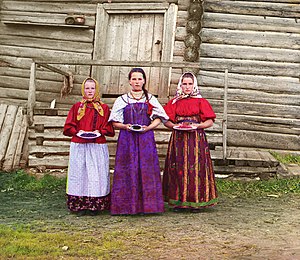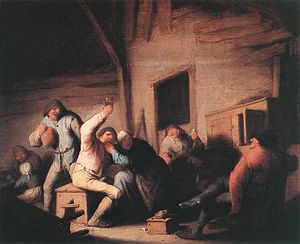Peasant

A peasant is a member of a traditional class of farmers, either laborers or owners of small farms, especially in the Middle Ages under feudalism, or more generally, in any pre-industrial society.[1][2] In Europe, peasants were divided into three classes according to their personal status: slave, serf, and freeman. Peasants either hold title to land in fee simple, or hold land by any of several forms of land tenure, among them socage, quit-rent, leasehold, and copyhold.[3]
Etymology

The word is derived from the 15th century French word païsant meaning one from the pays, or countryside, ultimately from the Latin pagus, or outlying administrative district.[4] Tihhhh
Social Position
Peasants typically make up the majority of the agricultural labour force in a pre-industrial society. The majority of the people in the Middle Ages were peasants. Though "peasant" is a word of loose application, once a market economy has taken root the term peasant proprietors is frequently used to describe the traditional rural population in countries where smallholders farm much of the land. More generally, the word "peasant" is sometimes used to refer pejoratively to those considered to be "lower class", perhaps defined by poorer education and/or a lower income.
Medieval European peasants
The relative position of peasants in Western Europe improved greatly when the Black Death unsettled the demography of medieval Europe in the mid-14th century.
In the wake of this disruption to the established order, later centuries saw the invention of the printing press, the development of widespread literacy and the enormous social and intellectual changes of the Enlightenment.
The evolution of ideas in an environment of relatively widespread literacy laid the groundwork for the Industrial Revolution, which enabled mechanically- and chemically-augmented agricultural production while simultaneously increasing the demand for factory workers in cities. Urban factory-workers, with their low skill and large numbers, quickly came to occupy the socio-economic stratum formerly the preserve of the medieval peasants.
This process happened in an especially pronounced and truncated way in Eastern Europe. Lacking any catalysts for change in the 14th century, Eastern European peasants largely continued upon the original medieval path until the 18th and 19th centuries. Serfdom was abolished in Russia in 1861, and while many peasants would remain in areas where their family had farmed for generations, the changes did allow for the buying and selling of lands traditionally held by peasants, and for landless ex-peasants to move to the cities.[5] Even before emancipation in 1861, serfdom was on the wane in Russia. The proportion of serfs within the empire had gradually decreased "from 45-50 percent at the end of the eighteenth century, to 37.7 percent in 1858."[6]
Early modern Germany

In Germany, peasants continued to center their lives in the village well into the 19th century. They belonged to a corporate body and helped to manage the community resources and to monitor community life.[7] In the East they had the status of serfs bound permanently to parcels of land.
In most of Germany, farming was handled by tenant farmers who paid rents and obligatory services to the landlord - typically a nobleman.[8] Peasant leaders supervised the fields and ditches and grazing rights, maintained public order and morals, and supported a village court which handled minor offenses. Inside the family the patriarch made all the decisions, and tried to arrange advantageous marriages for his children. Much of the villages' communal life centered around church services and holy days. In Prussia, the peasants drew lots to choose conscripts required by the army. The noblemen handled external relationships and politics for the villages under their control, and were not typically involved in daily activities or decisions.[9]
19th century France

In his seminal book Peasants into Frenchmen: the Modernization of Rural France, 1880–1914 (1976), historian Eugen Weber traced the modernization of French villages and argued that rural France went from backward and isolated to modern and possessing a sense of French nationhood during the late 19th and early 20th centuries.[10] He emphasized the roles of railroads, republican schools, and universal military conscription. He based his findings on school records, migration patterns, military-service documents and economic trends. Weber argued that until 1900 or so a sense of French nationhood was weak in the provinces. Weber then looked at how the policies of the Third Republic created a sense of French nationality in rural areas.[11] The book was widely praised, but some[12] argued that a sense of Frenchness existed in the provinces before 1870.
Historiography
Since the literate classes have left the most records, and these tended to dismiss peasants as figures of coarse appetite and rustic comedy, the term "peasant" may have a pejorative rather than descriptive connotation in historical memory. Society was theorized as being organized into three "estates": those who work, those who pray, and those who fight.[13] The Annales School of French historians emphasized the importance of peasants. Its leader Fernand Braudel devoted the first volume–called The Structures of Everyday Life–of his major work, Civilization and Capitalism 15th–18th Century to the largely silent and invisible world that existed below the market economy.
Other research in the field of peasant studies was promoted by Florian Znaniecki and Fei Xiaotong, and in the post-1945 studies of the "great tradition" and the "little tradition" in the work of Robert Redfield. In the 1960s, anthropologists and historians began to rethink the role of peasant revolt in world history and in their own disciplines. Peasant revolution was seen as a Third World response to capitalism and imperialism.[14]
The anthropologist Eric Wolf, for instance, drew on the work of earlier scholars in the Marxist tradition such as Daniel Thorner, who saw the rural population as a key element in the transition from feudalism to capitalism. Wolf and a group of scholars[who?] criticized both Marx and the field of modernization theorists for treating peasants as lacking the ability to take action.[15] James C. Scott's field observations in Malaysia convinced him that villagers were active participants in their local politics even though they were forced to use indirect methods. Many of these activist scholars looked back to the Peasant movement in India and to the theories of the revolution in China led by Mao Zedong starting in the 1920s. The anthropologist Myron Cohen, however, asked why the rural population in China were called "peasants" rather than "farmers", a distinction he called political rather than scientific.[16] One important outlet for their scholarly work and theory was the Journal of Peasant Studies.
See also


- Agrarianism
- Family economy
- Feudalism
- Folk culture
- Peasant economics
- Peasant Party (political movements in various countries)
- Peasants' Revolt
- Petty nobility
- Popular revolt in late-medieval Europe
- Serfdom
Other terms for "peasant"
- Aloer
- Campesino
- Churl
- Cotter
- Fellah
- Free tenant
- Hari
- Honbyakushō
- Kotsias
- Krestyanin
- Kulak
- Muzhik
- Nóngmín
- Pagesos de remença
- Peon
- Serf
- Smerd
- Ṭǎran
- Tenant farmer
- Vecin
- Villein
Notes and references
- ^ peasant, def. A.1.a. n. OED Online. March 2012. Oxford University Press. 28 May 2012
- ^ Merrian-Webster online "peasant"
- ^ Webster, Hutton (1 June 2004). Early European History. Kessinger Publishing. p. 440. ISBN 978-1-4191-1711-4. Retrieved 3 June 2012.
- ^ Webster's Ninth New Collegiate Dictionary p. 846, 866
- ^ David Moon, The abolition of serfdom in Russia, 1762-1907 (2001) pp 98-114
- ^ Pipes, Richard (1974, 1995). Russia Under the Old Regime: Second edition. p. 163. ISBN 978-0140247688.
{{cite book}}: Check date values in:|year=(help)CS1 maint: year (link) - ^ Eda Sagarra, A Social History of Germany: 1648-1914 (1977) pp. 140-54
- ^ The monasteries of Bavaria, which controlled 56% of the land, were broken up by the government, and sold off around 1803. Thomas Nipperdey, Germany from Napoleon to Bismarck: 1800-1866 (1996), p 59
- ^ For details on the life of a representative peasant farmer, who migrated in 1710 to Pennsylvania, see Bernd Kratz, he was a farmer, "Hans Stauffer: A Farmer in Germany before his Emigration to Pennsylvania," Genealogist, Fall 2008, Vol. 22 Issue 2, pp 131-169
- ^ Joseph A. Amato, "Eugen Weber's France" Journal of Social History, Volume 25, 1992 pp 879–882.
- ^ Eugen Weber, "The Second Republic, Politics, and the Peasant," French Historical Studies Vol. 11, No. 4 (Autumn, 1980), pp. 521-550 in JSTOR
- ^ Ted W. Margadant, "French Rural Society in the Nineteenth Century: A Review Essay," Agricultural History, Summer 1979, Vol. 53 Issue 3, pp 644-651
- ^ Richard Southern: The Making of the Middle Ages (1952)
- ^ Eric R. Wolf, Peasants (Englewood Cliffs, N.J.,: Prentice-Hall, 1966).
- ^ Eric R. Wolf, Peasant Wars of the Twentieth Century (New York,: Harper & Row, 1969).
- ^ Myron Cohen, "Cultural and Political Inventions in Modern China: The Case of the Chinese 'Peasant'", Daedalus 122.2 (Spring 1993): 151-170.
Bibliography
- Bix, Herbert P. Peasant Protest in Japan, 1590-1884 (1986)
- Cohen, Myron. "Cultural and Political Inventions in Modern China: The Case of the Chinese 'Peasant'", Daedalus 122.2 (Spring 1993): 151-170.
- Evans, Richard J., and W. R. Lee, eds. The German Peasantry: Conflict and Community from the Eighteenth to the Twentieth Centuries (1986)
- Hobsbawm, E. J. "Peasants and politics," Journal of Peasant Studies, Volume 1, Issue 1 October 1973, pages 3 – 22 - article discusses the definition of "peasant" as used in social sciences
- Macey, David A. J. Government and Peasant in Russia, 1861-1906; The Pre-History of the Stolypin Reforms (1987).
- Wolf, Eric R. Peasants (Prentice-Hall, 1966).
- Wolf, Eric R. Peasant Wars of the Twentieth Century (Harper & Row, 1969).
Recent
- Akram-Lodhi, A. Haroon, and Cristobal Kay, eds. Peasants and Globalization: Political Economy, Rural Transformation and the Agrarian Question (2009)
- Barkin, David. "Who Are The Peasants?" Latin American Research Review, 2004, Vol. 39 Issue 3, pp 270–281
- Brass, Tom. Peasants, Populism and Postmodernism (2000)
- Brass, Tom, ed. New Farmers' Movements in India (1995)
- Brass, Tom, ed. Latin American Peasants (2003)
- Scott, James C. The Moral Economy of the Peasant: Rebellion and Subsistence in Southeast Asia (2008)
